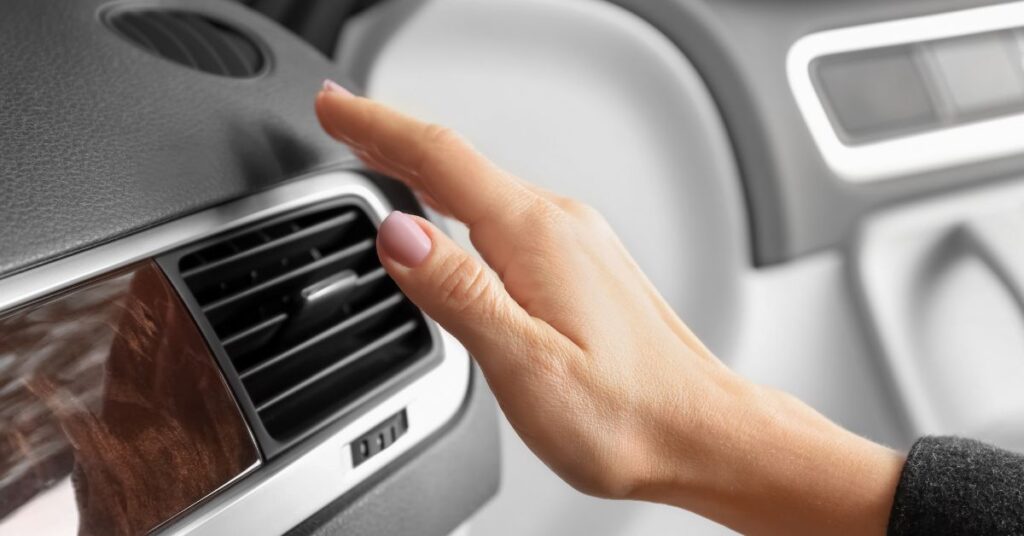
Table of Contents
During Atlanta’s summer months, your car’s air conditioning system is not just a luxury, it’s essential. This article will help you understand the signs of AC failure and when you should consider a car air conditioning replacement.
Understanding Your Car’s AC System
The air conditioning system in your car is a complex system of parts. It comprises the compressor, condenser, expansion valve, and evaporator, which are crucial in cooling the air blown into your car’s cabin.
The compressor, often called the system’s heart, pressurizes and circulates the refrigerant. The condenser changes the high-pressure refrigerant vapor into a high-pressure liquid. The expansion valve regulates the pressure of the refrigerant, and the evaporator removes heat from your car’s interior, releasing it outside. Understanding how these parts work together can help you identify the early symptoms of car AC issues, potentially saving you from more extensive car air conditioning replacement.
Recognizing the Signs of Car AC Failure
Identifying a failing AC system is easier when you know what to look for. Here are some ways to tell that your AC system is failing or not performing at its best:
Inadequate Cooling: Does your car take longer to reach the desired temperature level? That’s a clear indication of a potential issue with your AC system. This could be due to several factors, including low refrigerant levels, a clogged condenser, a failing compressor, or other problems.
Unusual Noises: Strange sounds, such as rattling, buzzing, or hissing when the AC is turned on, can signal problems. These noises might indicate a failing compressor or other damaged components in your AC system.
Foul Odors: If turning on your AC emits a bad or musty smell, mold or mildew could be in your system. This not only affects the performance of your AC but can also impact your health.
Leaks Under Your Car: If you notice puddles of water inside your car or significant leaks under your car, your AC system could be at fault. This could be due to a clogged drain hose or refrigerant leak requiring immediate attention.
AC Doesn’t Turn On: There is likely a significant issue if your AC system doesn’t turn on. McCullough NAPA Auto Care can diagnose the problem for you and make repairs as needed.
Recognizing these car AC symptoms early can help you address issues before they escalate into major problems.
When To Consider Air Conditioning Replacement
Deciding to replace your car’s AC system can be challenging. You’ll want to consider factors like how old your AC system is, how often repairs were needed in the past and how much they cost, and the system’s overall performance. If your AC system is old and repairs are becoming more frequent and costly, replacement might be the most economical and effective solution.
If your AC is consistently underperforming, it may be more advantageous to consider a complete car air conditioning replacement. Replacing your car’s AC system can give you a more efficient and reliable experience, particularly in hot weather.
The Importance of Professional Inspection and Consultation
While recognizing signs of AC failure is essential, there’s no substitute for professional inspection and consultation. A professional AC inspection can accurately diagnose the exact issue with your AC system, helping you avoid unnecessary repairs or replacements. The professionals at McCullough NAPA Auto Care have the experience, knowledge, and tools to help determine whether an AC repair or replacement is the most cost-effective solution for you.
Additionally, McCullough NAPA Auto Care offers many services beyond AC repair and replacement. We offer scheduled maintenance plans to keep your car running smoothly. You can trust our team to provide top-quality service.
Remember, a comfortable ride isn’t just about convenience but safety and vehicle longevity. Regular check-ups and prompt responses to the signs of AC failure are crucial to maintaining an efficient and reliable AC system. If you’re experiencing any issues with your car’s air conditioning, don’t hesitate to contact McCullough NAPA Auto Care for a professional consultation and service.
FAQ About Air Conditioning Repair and Replacement
It depends on the overall condition of your car. If your vehicle is relatively new or in excellent shape, then investing in a new AC compressor can be a cost-effective solution to keep your ride comfortable. However, if your car is older and requires frequent repairs, replacing the entire vehicle might be more economical in the long run.
Tell-tale signs of a faulty compressor include decreased cooling, strange noises when the AC is running, and the compressor clutch not moving. If your AC isn’t blowing cold air or if you notice refrigerant leaks, it’s a good idea to have your compressor checked out.
This depends on several factors, including the vehicle’s age, use, and maintenance history. Generally, a well-maintained car AC system can last 10-15 years before needing a complete replacement. Regular check-ups and maintenance can extend its lifespan.
Typically, replacing an AC compressor can take about 3-5 hours. However, this can vary based on the vehicle’s make and model, and the specific nature of the work involved.
With proper maintenance, a car AC compressor can last an average of 10-15 years. Keep in mind that this is a general estimate and can vary based on factors such as the make and model of your car, how often you use the AC, and the quality of maintenance it receives.
Signs that your car AC might be failing include inadequate cooling, unusual noises, unpleasant odors, and leaks under the car. If your AC isn’t cooling the vehicle effectively or you notice any other odd symptoms, it’s time for a check-up.
This can be due to several reasons: low refrigerant levels, a clogged condenser, electrical issues, or a failing compressor. It’s best to have a professional diagnose the exact issue.
The compressor is typically the most expensive part of a car’s air conditioning system. It’s often referred to as the “heart” of the system as it’s responsible for circulating the refrigerant. However, costs can vary based on the make and model of the car.

